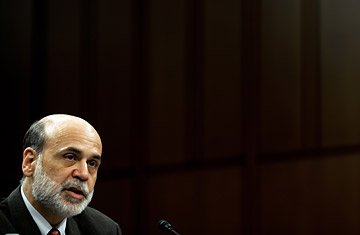
Chairman of the Federal Reserve, Ben Bernanke
Ben Bernanke's comments about the recession and his reasons for believing that the economy has hit bottom could have been a mimeograph of a dozen other speeches made by Fed chairmen testifying before Congress in times of crisis over the last forty years. Arthur Burns probably made the same speech in 1973 and put it in an envelope for Paul Volker to use in 1982.
Bernanke said that the economy should start to see improvement by the end of the year. He pointed to housing and inventories as signs that business and consumer activity are starting to quicken. Bernanke put in the normal caveat which is always that the government's stimulation and regulation are critical to the healing process. If the economy could have healed itself, it would have already. (See pictures of the global financial crisis.)
Bernanke has proven himself to be a particularly talented public servant. He saw the credit crisis coming and adjusted the central bank's policies at a rate which was abnormally fast based on Fed history. He offered hundreds of millions of dollars of liquidity to banks that probably would have collapsed without it. He manhandled the people who got in his way, most recently Ken Lewis from Bank of America (BAC).
Bernanke has shown that he has evolved from being an academic to being a man of action, but he has not made any progress as an economist. He takes a position of optimism balanced by caution in almost all of his public statements, which makes them nearly useless.
Bernanke's comments to Congress were not particularly useful because they did not increase the country's understanding of America's economic problems. The recovery is about to begin. It will be slow. Unemployment will stay high for a long time. It is still a risky period. One or two missteps and the ground the economy could gain would then be lost.
Bernanke looks at the economic world from 30,000 feet. That has intellectual value and may even contribute to proper administration of the stimulation necessary to improve the financial system. The disadvantage of seeing the system that way is the world is lifeless when contemplated at such a great distance. It is impossible to see a person out of work from six miles away. Bernanke's academic background allows him to understand that inventories are low and home prices are affordable. He sees a small movement of the needle of the economy and says it is a trend.
Unemployment could be nearly 10% by mid-year, and it could stay at that level for several quarters. That is clearly not part of Mr. Bernanke's forecast. It is not in the model because it has not happened since the recession of the 1980s and employment improved fairly quickly after hitting a peak at just over 10%. That recession twenty five years ago was not as bad as this one, at least according to experts. Amateur economists might believe that a worse recession would probably cause worse unemployment.
The recovery cannot make much progress or be sustained while the number of people without jobs is at historic highs. Mr. Bernanke fails to acknowledge this. He used inventory and housing numbers to make his case that the economy is beginning to improve. That is hardly enough to prove the point.
— Douglas A. McIntyre
Submit your questions for CNBC's Jim Cramer here
See pictures of the Top 10 scared traders.
For constant business updates, go to 24/7wallst.com.
